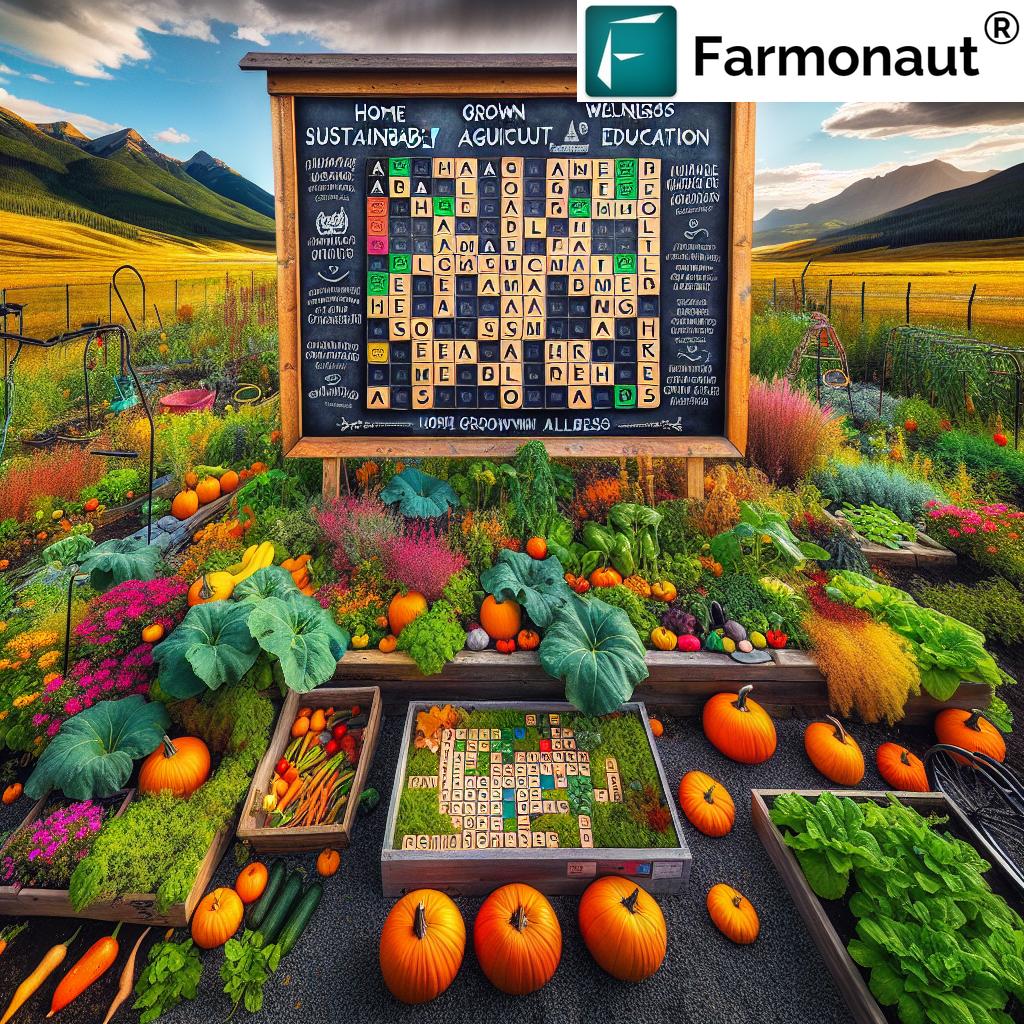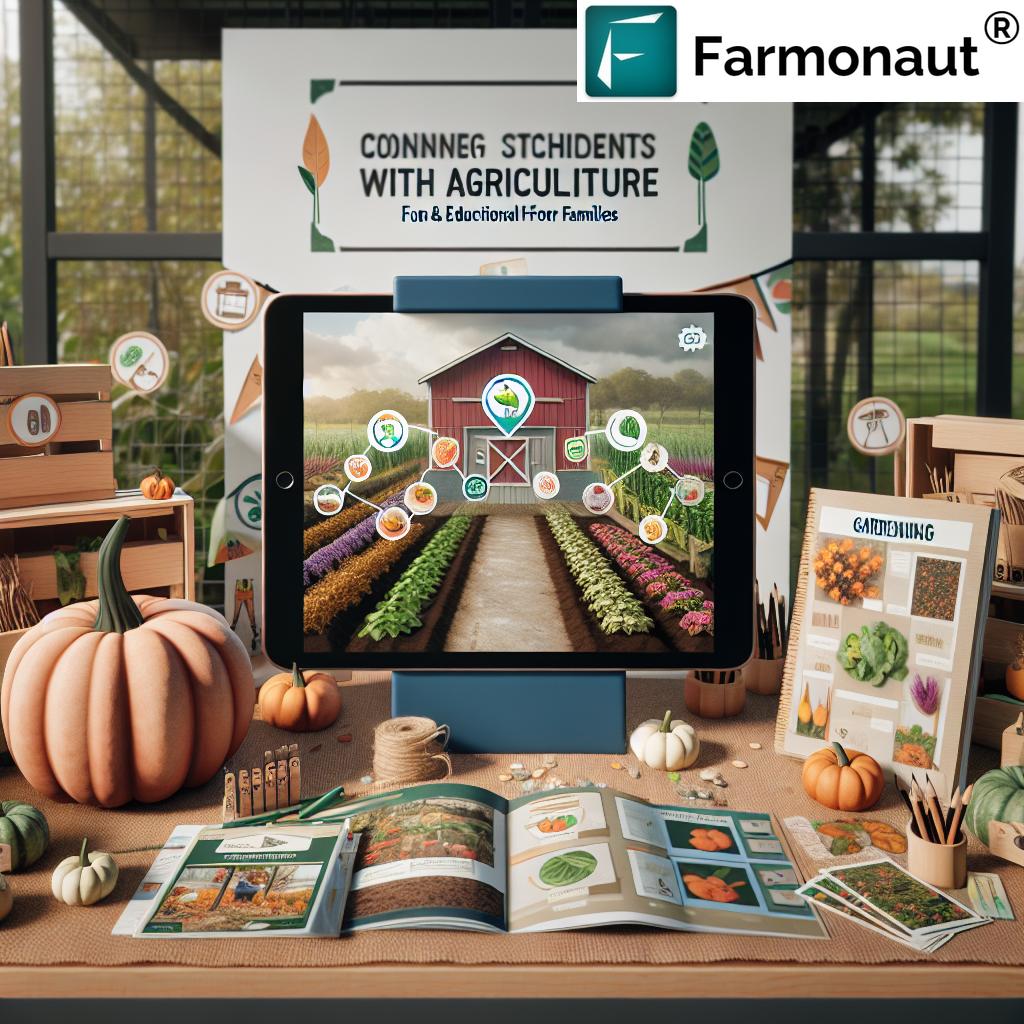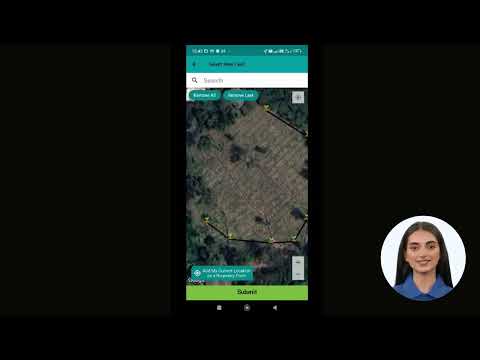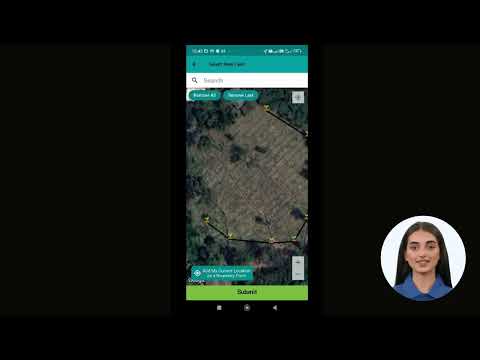Grow Your Knowledge: Fun Edible Garden Word Scramble for Alberta Families
Welcome to Farmonaut’s exciting journey into the world of edible gardening and sustainable agriculture education! We’re thrilled to bring you a delightful blend of fun and learning, perfect for Alberta families looking to explore the joys of home-grown produce and agricultural activities. Get ready to engage your mind, test your knowledge, and discover the wonders of gardening right in your backyard!

“Alberta families can learn over 20 gardening terms through Farmonaut’s edible garden word scramble game.“
Dig Into Our Edible Garden Word Scramble!
Let’s kick things off with our interactive Word Scramble Challenge! This fun activity is designed to test your knowledge of gardening and agriculture terms while teaching you new concepts. Grab your family members and see who can unscramble these words the fastest!
| Scrambled Word | Hint | Unscrambled Word |
|---|---|---|
| NIKPUMP | A fall favorite in Alberta patches | PUMPKIN |
| MOSPCOT | Decomposed organic matter for soil | COMPOST |
| STORF | A gardener’s enemy in cold weather | FROST |
| DINGWEE | Removing unwanted plants | WEEDING |
| RITAIGONI | Watering your plants | IRRIGATION |
How did you do? This word scramble is just the beginning of our agricultural adventure. As we continue, we’ll explore more about edible gardening, sustainable practices, and the exciting world of agriculture in Alberta.
Discover the Joy of Edible Gardening
Edible gardening is a wonderful way to connect with nature, understand food production, and enjoy the fruits (quite literally!) of your labor. Here are some compelling reasons why you should consider starting an edible garden:
- Fresh, Healthy Produce: Nothing beats the taste and nutritional value of home-grown vegetables and fruits.
- Family Bonding: Gardening is an excellent activity for families to work together and share responsibilities.
- Environmental Impact: By growing your own food, you reduce your carbon footprint and promote sustainability.
- Educational Opportunity: Children learn about plant life cycles, nutrition, and the importance of caring for living things.
- Cost-Effective: Save money on groceries by growing your own herbs, vegetables, and fruits.
At Farmonaut, we’re passionate about helping families like yours embrace the world of agriculture, whether it’s in your backyard or on a larger scale. Our satellite-based farm management solutions can even help you monitor your garden’s health and growth!
Home Gardening Tips for Alberta Families
Alberta’s unique climate presents both challenges and opportunities for home gardeners. Here are some tips to help you create a thriving edible garden in your backyard:
- Choose Cold-Hardy Plants: Opt for vegetables that can withstand Alberta’s cooler temperatures, such as kale, carrots, and peas.
- Start Seeds Indoors: Begin your gardening journey early by starting seeds indoors before the last frost date.
- Use Season Extenders: Employ cold frames or row covers to protect your plants and extend the growing season.
- Practice Companion Planting: Plant compatible crops together to maximize space and deter pests naturally.
- Mulch Heavily: Use organic mulch to retain moisture and regulate soil temperature.
Remember, successful gardening is all about understanding your local environment and adapting your practices accordingly. With Farmonaut’s advanced satellite imagery and AI-driven insights, you can take your gardening game to the next level!
Virtual Tour: Explore an Alberta Pumpkin Patch
Let’s take a virtual journey to one of Alberta’s charming pumpkin patches! These autumnal attractions offer more than just a chance to pick the perfect jack-o’-lantern; they’re also fantastic educational opportunities for families to learn about agriculture.
“Pumpkin patches in Alberta offer a dual experience: fun fall activities and lessons in sustainable agriculture practices.“
As we explore our virtual pumpkin patch, let’s highlight some key features:
- Diverse Pumpkin Varieties: From tiny decorative gourds to massive carving pumpkins, observe the incredible diversity within the Cucurbita family.
- Sustainable Farming Practices: Notice how farmers use crop rotation and natural pest control methods to maintain soil health and reduce chemical use.
- Water Conservation: Learn about efficient irrigation systems that help conserve water while ensuring healthy pumpkin growth.
- Pollinator Gardens: Spot the areas dedicated to attracting bees and other pollinators, crucial for pumpkin production.
- Educational Signage: Look out for informative signs that teach visitors about pumpkin life cycles, nutrition facts, and fun trivia.
This virtual tour showcases how agricultural activities can be both fun and educational for families. It’s a perfect example of how we can connect students with agriculture, bridging the gap between urban life and rural farming practices.

Managing Halloween Pumpkin Food Waste
After the spooky season ends, many families find themselves wondering what to do with their Halloween pumpkins. Instead of letting them go to waste, consider these environmentally friendly options:
- Compost: Chop up your pumpkin and add it to your compost bin for nutrient-rich soil next spring.
- Cook and Eat: Many pumpkin varieties are edible and delicious in soups, pies, and breads.
- Feed Wildlife: Break up the pumpkin and leave it in a wildlife-friendly area of your yard.
- Donate to Farms: Some local farms accept pumpkin donations to feed livestock.
- Plant the Seeds: Save the seeds to grow your own pumpkins next year!
By managing pumpkin waste responsibly, we can reduce our environmental impact and contribute to a more sustainable agricultural cycle. At Farmonaut, we’re committed to promoting sustainable practices in all aspects of farming and gardening.
Explore Farmonaut’s API for advanced agricultural insights
Interactive Farming Games for Family Fun
Engaging in interactive farming games is a fantastic way to learn about agriculture while having fun with your family. Here are some ideas for agricultural activities you can enjoy together:
- Plant Identification Challenge: Create flashcards with pictures of common Alberta crops and see who can identify the most.
- Farm-to-Table Meal Planning: Plan a meal using only locally sourced ingredients, teaching about food systems and seasonality.
- Virtual Farm Simulator: Use online farming simulation games to learn about crop management and resource allocation.
- Agricultural Trivia Night: Host a family trivia night with questions about Alberta’s agricultural history and practices.
- Seed Planting Race: See who can plant a row of seeds the fastest while maintaining proper spacing and depth.
These activities not only provide entertainment but also foster a deeper understanding and appreciation for the agricultural world. At Farmonaut, we believe that learning about farming should be accessible and enjoyable for everyone, regardless of their background or location.
Agriculture Education Resources for Alberta Families
To further your family’s agricultural education, we’ve compiled a list of valuable resources specifically tailored for Alberta residents:
- Alberta Agriculture and Forestry Website: Offers a wealth of information on local farming practices, crop varieties, and educational programs.
- 4-H Alberta: Provides youth with hands-on agricultural experiences and leadership opportunities.
- Alberta Farm to School: Connects schools with local food producers to educate students about agriculture and nutrition.
- Ag for Life: Delivers educational programming to improve rural and farm safety knowledge among Albertans.
- Local Farmers’ Markets: Great places to meet farmers, learn about local produce, and support the community.
These resources can help deepen your understanding of Alberta’s agricultural landscape and provide opportunities for hands-on learning experiences. Remember, education is a key component of sustainable agriculture, and we at Farmonaut are proud to contribute to this vital field.
Check out our API Developer Docs for in-depth agricultural data
Connecting Students with Agriculture
Bridging the gap between urban students and rural agriculture is crucial for fostering a new generation of informed consumers and potential future farmers. Here are some ways to connect students with agriculture:
- School Garden Programs: Implement edible gardens in schools to provide hands-on learning experiences.
- Farm Field Trips: Organize visits to local farms for students to see agricultural practices firsthand.
- Agricultural Guest Speakers: Invite farmers or agricultural experts to speak in classrooms about their work and experiences.
- Farm-to-School Lunch Programs: Incorporate locally sourced ingredients into school meals and educate students about their origins.
- Agricultural Science Projects: Encourage students to participate in science fairs with agriculture-themed projects.
By engaging students with agriculture, we can cultivate a greater appreciation for the food system and inspire future innovations in sustainable farming practices. Farmonaut’s technologies, such as satellite imagery and AI-driven insights, can play a role in these educational initiatives by providing students with cutting-edge tools to understand modern agriculture.
The Impact of Home Gardening on Wellness and Safety
Engaging in home gardening activities can have a significant positive impact on both personal wellness and community safety. Let’s explore some of these benefits:
Wellness Benefits:
- Physical Exercise: Gardening provides low-impact exercise, improving cardiovascular health and strength.
- Stress Reduction: Working with plants and soil has been shown to lower cortisol levels and reduce anxiety.
- Improved Nutrition: Home-grown produce encourages healthier eating habits and a more varied diet.
- Vitamin D Exposure: Outdoor gardening increases exposure to sunlight, boosting vitamin D levels.
- Sense of Accomplishment: Growing your own food fosters a sense of pride and self-sufficiency.
Safety Considerations:
- Food Security: Home gardens can provide a reliable source of fresh produce during uncertain times.
- Reduced Chemical Exposure: Control over growing methods allows for organic, pesticide-free produce.
- Community Engagement: Gardening can foster stronger neighborhood connections, improving community safety.
- Environmental Awareness: Hands-on experience with plants increases understanding of environmental issues.
- Emergency Preparedness: Gardening skills contribute to self-reliance in case of food supply disruptions.
At Farmonaut, we believe that promoting home gardening is not just about growing food; it’s about cultivating healthier, safer, and more connected communities. Our technology can help even novice gardeners monitor their plants’ health and make informed decisions for a thriving garden.
Sustainable Agriculture Education: Beyond the Backyard
While home gardening is an excellent starting point, understanding larger-scale sustainable agriculture practices is crucial for addressing global food security and environmental challenges. Here’s how we can expand our knowledge:
- Learn About Crop Rotation: Understand how alternating crops can improve soil health and reduce pest problems.
- Explore Permaculture Principles: Discover how to create agricultural ecosystems that are self-sustaining and harmonious with nature.
- Study Water Conservation Techniques: Learn about efficient irrigation systems and water management in agriculture.
- Investigate Organic Farming Methods: Explore alternatives to synthetic pesticides and fertilizers for healthier food production.
- Research Agroforestry: Understand how integrating trees with crops or livestock can benefit the environment and farm productivity.
Farmonaut’s satellite-based technologies play a significant role in modern sustainable agriculture. Our tools help farmers make data-driven decisions that optimize resource use, reduce waste, and improve crop yields while minimizing environmental impact.
Harvesting Knowledge: The Future of Agriculture
As we conclude our journey through edible gardens, word scrambles, and agricultural education, it’s important to look towards the future. The agricultural sector is rapidly evolving, with technology playing an increasingly vital role in ensuring food security and sustainability.
At Farmonaut, we’re at the forefront of this agricultural revolution. Our satellite-based farm management solutions, AI-driven advisory systems, and blockchain-based traceability tools are helping farmers around the world improve their practices and yields. We’re committed to making precision agriculture accessible and affordable for all, from small backyard gardens to large-scale operations.
By engaging in activities like our word scramble, exploring virtual farm tours, and learning about sustainable practices, you’re taking important steps towards understanding and appreciating the complex world of agriculture. We encourage you to continue this journey of discovery, whether it’s by starting your own edible garden, supporting local farmers, or exploring career opportunities in agritech.
Remember, every seed planted, every vegetable harvested, and every new agricultural fact learned contributes to a more sustainable and food-secure future. Let’s grow this knowledge together!
Farmonaut Subscriptions
Frequently Asked Questions
Q: What is Farmonaut?
A: Farmonaut is an agricultural technology company that provides advanced, satellite-based farm management solutions. We offer services such as real-time crop health monitoring, AI-based advisory systems, and resource management tools to make precision agriculture accessible and affordable for farmers worldwide.
Q: How can Farmonaut help with home gardening?
A: While Farmonaut’s primary focus is on larger-scale agriculture, our technologies and insights can be valuable for home gardeners too. Our satellite imagery and AI-driven advice can help you monitor your garden’s health, understand optimal planting times, and make informed decisions about water and resource management.
Q: Is Farmonaut available in Alberta?
A: Yes, Farmonaut’s services are available globally, including in Alberta. Our satellite-based solutions can provide valuable insights for both small-scale gardeners and large agricultural operations in the region.
Q: How can I get started with Farmonaut?
A: You can start by downloading our mobile app or visiting our web application. We offer various subscription tiers to suit different needs and farm sizes. Check out our pricing table above for more information.
Q: Does Farmonaut offer educational resources for students interested in agriculture?
A: While we don’t provide direct educational programs, our blog and resources offer valuable insights into modern agricultural practices and technologies. These can be great supplementary materials for students and educators interested in agriculture and agritech.
We hope this blog post has sparked your interest in edible gardening and sustainable agriculture! Remember, whether you’re tending to a small herb garden or managing a large farm, Farmonaut is here to support your agricultural journey with cutting-edge technology and data-driven insights. Happy gardening!






